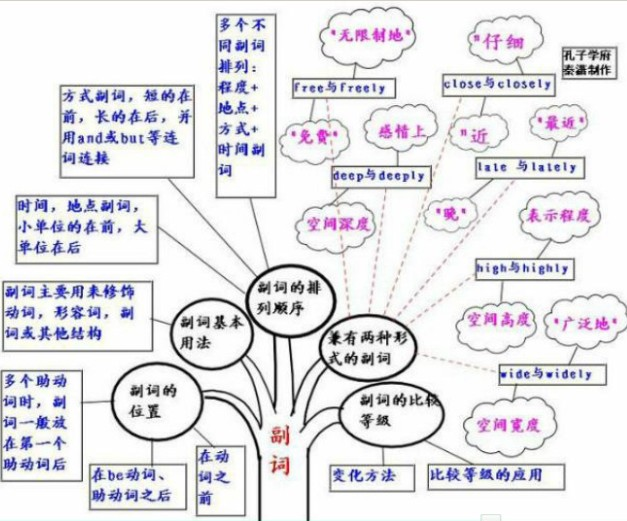本试题 “I was surprised ______little birds could eat ______ many insects in ______ a short time.[ ]A. that so; so; suchB. that so; such; suchC. that such; ...” 主要考查您对连接代词
副词
等考点的理解。关于这些考点您可以点击下面的选项卡查看详细档案。
- 连接代词
- 副词
连接代词的概念:
连接代词常用来引导一个主语从句、宾语从句和表语从句,在句中可用作主语、宾语、表语、定语等,连接代词主要包括who, whom, what, which, whose, whoever, whatever, whichever, whosever等。
whatever, whoever, whichever 用法说明:
主要用于引导主语从句和宾语从句。
如:He does whatever she asks him to do. 她要他做什么,他就做什么。
Whoever breaks the rules will be punished.谁违反这些规则都将受到处罚。
I'll give the ticket to whoever want sit. 请想要这票,我就把它给谁。
Whichever team gains the most points wins. 哪个队得分最多,哪个队就赢。
注:其中的ever主要用于加强语气,含有“一切”、“任何”、“无论”之义。使用这类词时,注意不要按汉语习惯用错句子结构:
如:任何人(谁)先来都可以得到一张票。
误:Anyone comes first can get a ticket./ Who comes first can get a ticket.
正:Anyone who comes first can get a ticket./ Whoever comes first can get a ticket.
连接代词的用法:
1、连接代词主要包括who, whom, what, which, whose, whoever, whatever, whichever, whosever等,它们在句中可用作主语、宾语、表语、定语等,可以引导主语从句、宾语从句和表语从句:
如:I don't know who he is. 我不知道他是谁。
What he says sounds reasonable. 他说的话听起来很有道理。
The question is who(m) we should trust. 问题是我们该信任谁。
I'll take whoever wants to go. 谁想去我就带谁去。
Take whichever seat you like? 你喜欢坐哪个座位就坐哪个?
I will just say whatever comes into my mind. 我想到什么就说什么。
注:who, whom, whoever等不用于名词前作定语。
2、what的两种用法。请看以下两个句子:
(1)I didn't know what he wanted. 我不知道他想要什么。
(2)I gave her what she wanted. 我给了她想要的一切。
上面第一句中的what表示“什么”,带有疑问的意味;第二句中的what表示“所…的一切事或东西”,其意义上大致相当于that(those) which, the thing(things) that, anything that, all that, as much as等,又如:
What[=That which] you say is quite true. 你说的完全是事实。
He saves what[=all that] he earns. 他赚多少,积蓄多少。
Call it what[=anything that] you please. 你喜欢叫它什么就叫它什么。
这样用的what有时还可后接一个名词:
如:He gave me what money[=all the money that] he had about him. 他把身边带有的钱全给了我。
What friends[=All the friends that] he has are out of the country. 他所有的朋友都在国外。
连接代词知识体系:

whatever, whoever, whichever 用法说明:
主要用于引导主语从句和宾语从句。
如:He does whatever she asks him to do. 她要他做什么,他就做什么。
Whoever breaks the rules will be punished.谁违反这些规则都将受到处罚。
I'll give the ticket to whoever want sit. 请想要这票,我就把它给谁。
Whichever team gains the most points wins. 哪个队得分最多,哪个队就赢。
注:其中的ever主要用于加强语气,含有“一切”、“任何”、“无论”之义。使用这类词时,注意不要按汉语习惯用错句子结构:
如:任何人(谁)先来都可以得到一张票。
误:Anyone comes first can get a ticket./ Who comes first can get a ticket.
正:Anyone who comes first can get a ticket./ Whoever comes first can get a ticket.
副词的概念:
副词是指在句子中表示行为或状态特征的词,用来修饰动词、形容词、其他副词、介词短语、非谓语动词乃至整个句子,表示时间、地点、程度、方式等概念。
副词的位置:
1)在动词之前。
2)在be动词、助动词之后。
3)多个助动词时,副词一般放在第一个助动词后。
注意:
a. 大多数方式副词位于句尾,但宾语过长,副词可以提前,以使句子平衡。
如:We could see very clearly a strange light ahead of us.
b. 方式副词well,badly糟、坏,hard等只放在句尾。
如:He speaks English well.
副词的排列顺序:
1)时间,地点副词,小单位的在前,大单位在后。
2)方式副词,短的在前,长的在后,并用and或but等连词连接。
如:Please write slowly and carefully.
3)多个不同副词排列:程度+地点+方式+时间副词。
注意:副词very可以修饰形容词,但不能修饰动词。
改错:(错)I very like English.
(对)I like English very much.
注意:副词enough要放在形容词的后面,形容词enough放在名词前后都可。
如:I don't know him well enough.
There is enough food for everyone to eat.
There is food enough for everyone to eat.
兼有两种形式的副词:
1)close与closely:
close意思是“近”;closely意思是“仔细地”。
如: He is sitting close to me.
Watch him closely.
2)late与lately:
late意思是"晚";lately意思是“最近” 。
如:You have come too late.
What have you been doing lately?
3)deep与deeply:
deep意思是“深”,表示空间深度;deeply时常表示感情上的深度,“深深地” 。
如:He pushed the stick deep into the mud.
Even father was deeply moved by the film.
4)high与highly:
high表示空间高度;highly表示程度,相当于much。
如:The plane was flying high.
I think highly of your opinion.
5)wide与widely:
wide表示空间宽度;widely意思是“广泛地”,“在许多地方”。
如:He opened the door wide.
English is widely used in the world.
6)free与freely:
free的意思是“免费”;freely的意思是“无限制地”。
如:You can eat free in my restaurant whenever you like.
You may speak freely, say what you like.
副词知识体系:

与“I was surprised ______little birds could eat ______ many ...”考查相似的试题有:
- If a person takes drugs, they will slow down his thinking and ________ turn off his brain.A.eventuallyB.certainlyC...
- Some people like wearing fashionable clothes; _____ some birds like brilliant feathers.[ ]A. immediatelyB. likelyC. c...
- On snowy days, you have to drive very_________to avoid traffic accidents.A.cautiouslyB.neatlyC.smoothlyD.Properly
- Now the city is _____ it used to be.[ ]A. three time larger asB. three times as large asC. larger as three times asD....
- ________ 200BC, the Silk Road, which was the route for trade between the East and the West, was in use.A.As early as...
- ______ the agreement was reached without conflict.A.HappyB.HappilyC.UnhappyD.Unhappily
- Thank you for your beautiful scarf. That’s______ what I need in such a cold winter.A.exactlyB.finallyC.luckilyD.h...
- _____ it was raining at that time, there were _____ a lot of people _____ to purchase the goods.[ ]A. Though; but; wa...
- —Is there anything I can do for you?—There seems to have been a technical problem—______,that’s what they told me.A...
- Lily seems to know a lot about Hong Kong, but she has never been there.A.luckilyB.strictlyC.actuallyD.naturally